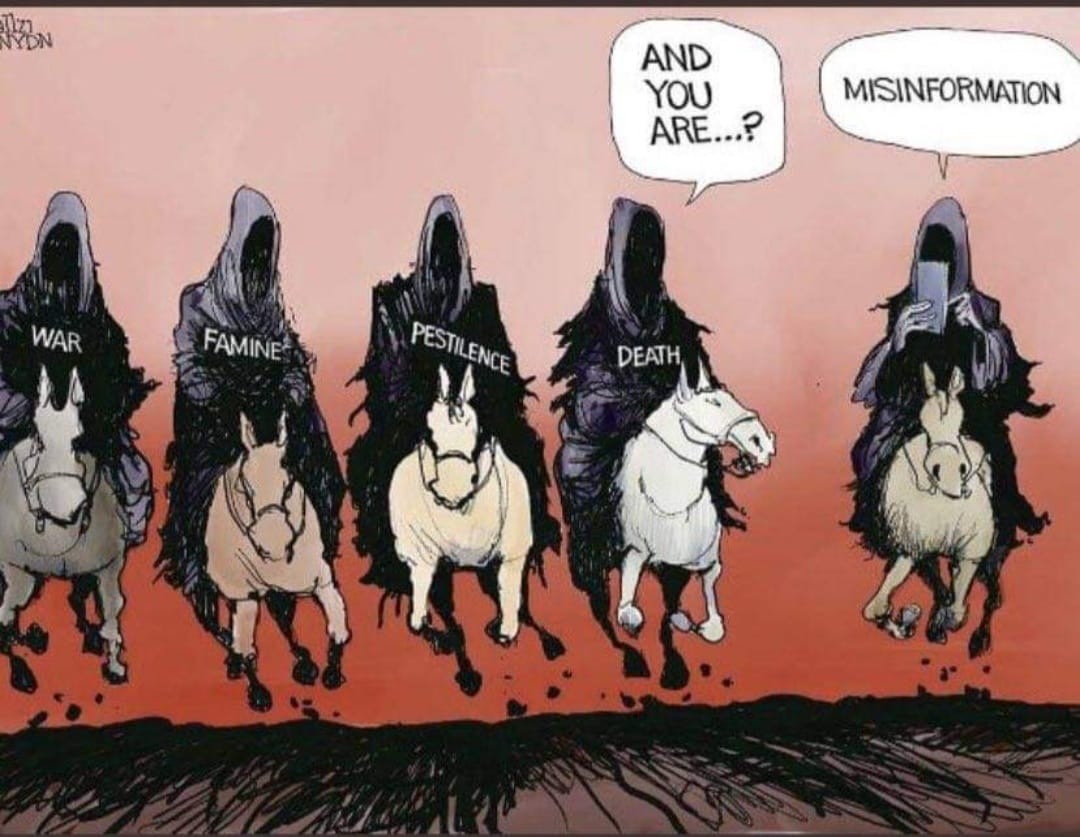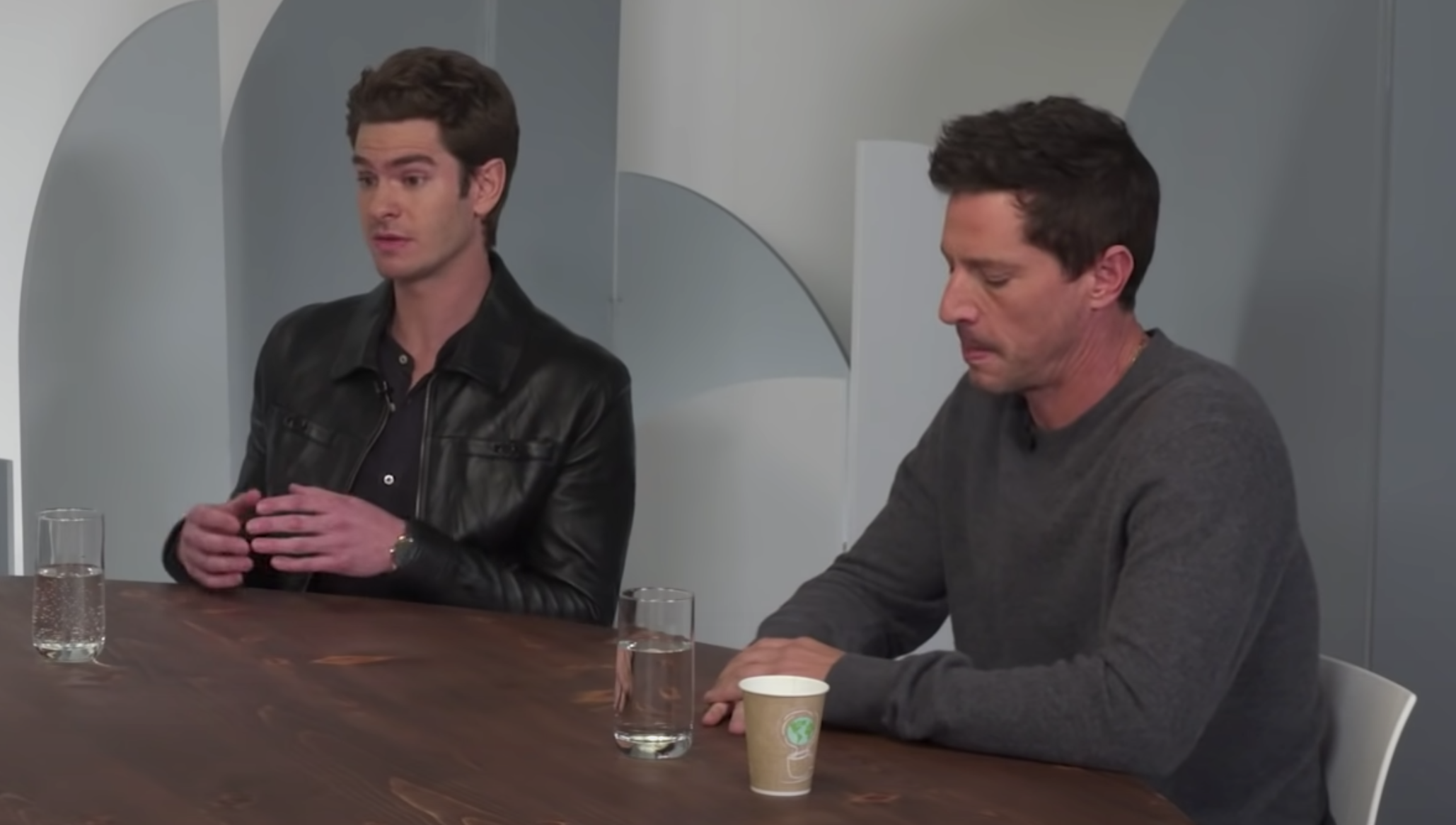At some point the mind isn’t as whip-sharp as it used to be…nothing wrong with a video-screen karaoke prompter. Recorded 30 years ago (’91 actually) for MTV Unplugged. For whatever reason I’d never watched this until today.
If You Come For The King
…you need to do it precisely and carefully, working your way up from the bumblefuck small fry and then to the medium-size conspirators and then to the Bannons, Meadows and Hannitys, and gradually focusing upon an air-tight case against the salivating Beast of Mar a Lago.
Even if — hello? — the entire civilized world of sane and sensible people has known all along that the Jan. 6th uprising was fully and entirely instigated by that beast…we’ve known that all along, for God-in-heaven’s sake.
“The actions we have taken [against January 6th felons and instigators] thus far will not be our last. The Justice Department remains committed to holding all January 6th perpetrators, at any level, accountable under law, whether they were present that day or were otherwise criminally responsible for the assault on our democracy. We will follow the facts wherever they lead.” — Attorney General Merrick Garland speaking earlier today about Jan. 6th prosecutions — past, present and future.


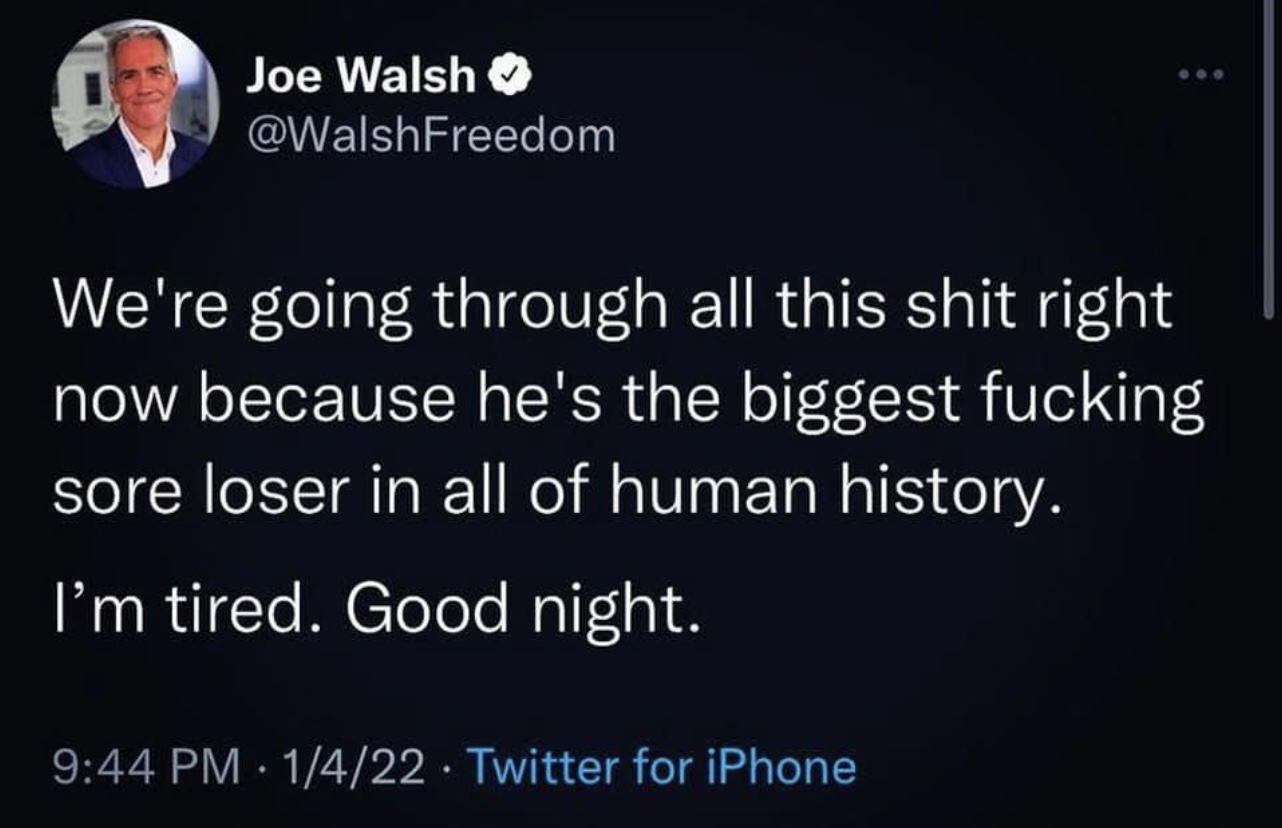
John Ford’s “Three Rode Together”
Over the last 15 days, three industry advocates in the award-season conversation — Hollywood Elsewhere’s Jeffrey Wells, Variety‘s Owen Gleiberman and Awards Daily‘s Sasha Stone — have endorsed the idea of Spider-Man: No Way Home being Best Picture nominated.
I was first out of the gate on 12.20.21, Gleiberman followed 11 days later later (12.31.21) and Stone followed Gleiberman three days after his post. Gleiberman is the heaviest hitter among us, agreed, and his Variety think-piece essays are confined to a weekly format.
1. “If The Academy Has Any Interest…” / 12.20.21 / Note: This is probably when I got Omicron — during a 12.16 viewing at the AMC Grove.
2. “Why The Academy Should Nominate ‘Spider-Man for Best Picture,” Variety’s Owen Gleiberman, 12.31.21 / https://variety.com/2021/film/columns/spider-man-no-way-home-oscars-analysis-best-picture-1235145184/
3. “Yes, Spider-Man Should Be Nominated — It’s a No-Brainer,” posted on 1.3.22 / https://www.awardsdaily.com/2022/01/01/yes-spider-man-should-be-nominated-for-best-picture-its-a-no-brainer/
Others have since picked up on this notion (in some cases disputing it, especially among the advocates of hothouse-flower nominees) but WE STARTED IT! Just saying!
Not Even A Dab of Mustard?
I don’t like to smother hot dogs. I don’t like the idea of stuff falling out or dripping onto the paper plate. But a few shards of onion shavings and maybe an ultra-light lathering of chili…that works. Betty White was strictly no-frills…no nothin’, just the dog.
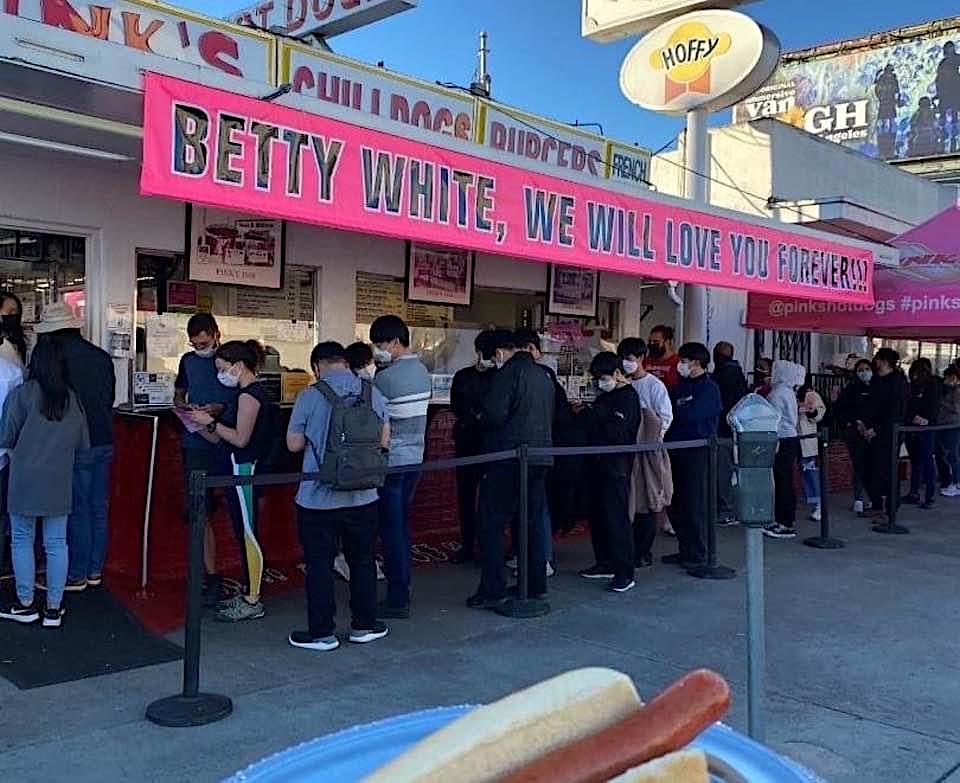
Too Bad, Sundance
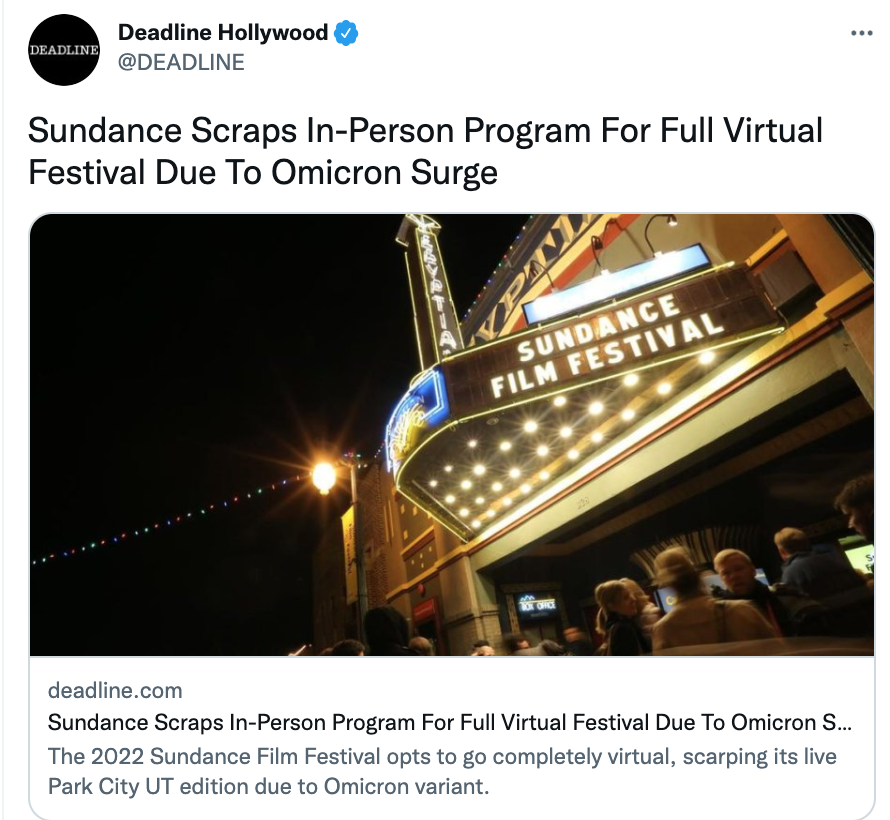
The Grammys have also deep–sixed themselves.
THR’s Rain Man Challenge
Thanks to a Hollywood Reporter roundtable discussion with five out-there, bold-as-brass actors (Pig‘s Nicholas Cage, Tik Tik…Boom‘s Andrew Garfield, Cyrano‘s Peter Dinklage, The Harder They Fall‘s Jonathan Majors and Red Rocket‘s Simon Rex), the reputation of Rain Man, the angriest horse in Montana and perhaps the entire continental United States, is spreading far and wide.
Rain Man kicked Cage’s ass during filming of the recently wrapped Butcher’s Crossing. Oddly, The Harder They Fall‘s Majors claims to have ridden the same damn horse, albeit an older, more mild-mannered version despite this happening during the fall of 2020 (i.e., a year before Cage came along).
THR needs to get together with a reality show producer and organize a Rain Man Challenge. Cage, Garfield, Dinklage, Rex and Majors are flown to Billings and each take their turn with Rain Man on the open range. (Or inside a large corral…whatever works.) The actor who creates the most profound bond with this angry horse and thereby “whispers” him into an alpha state will win the grand prize.
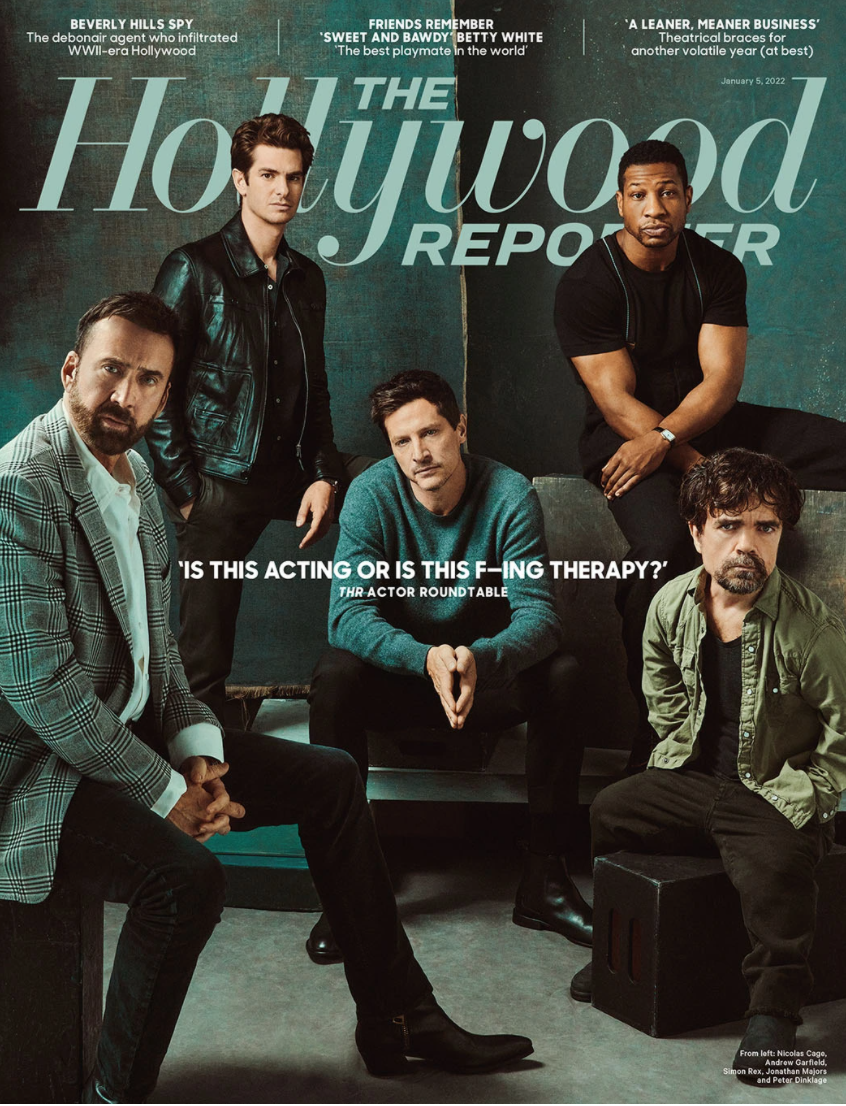
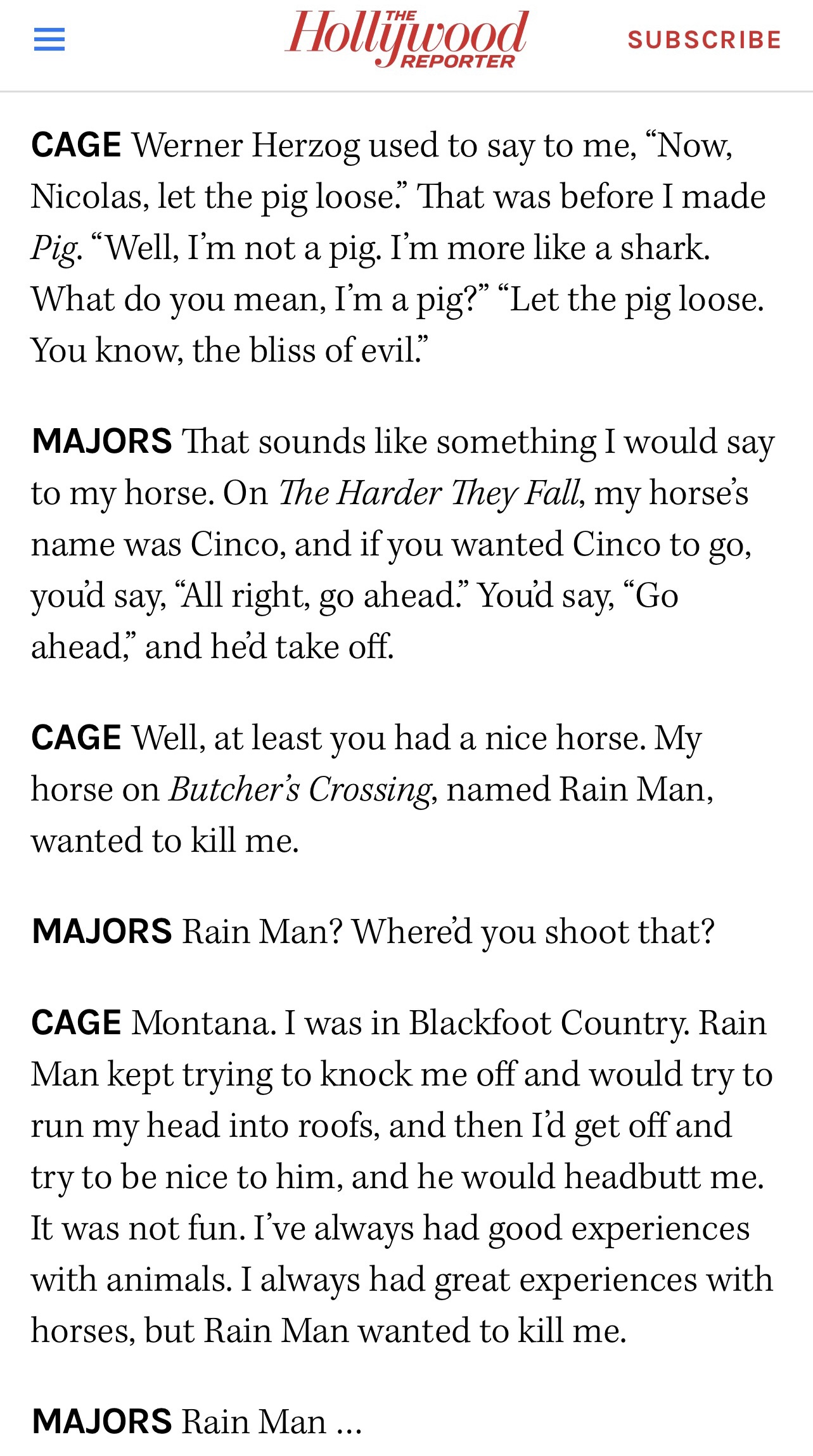
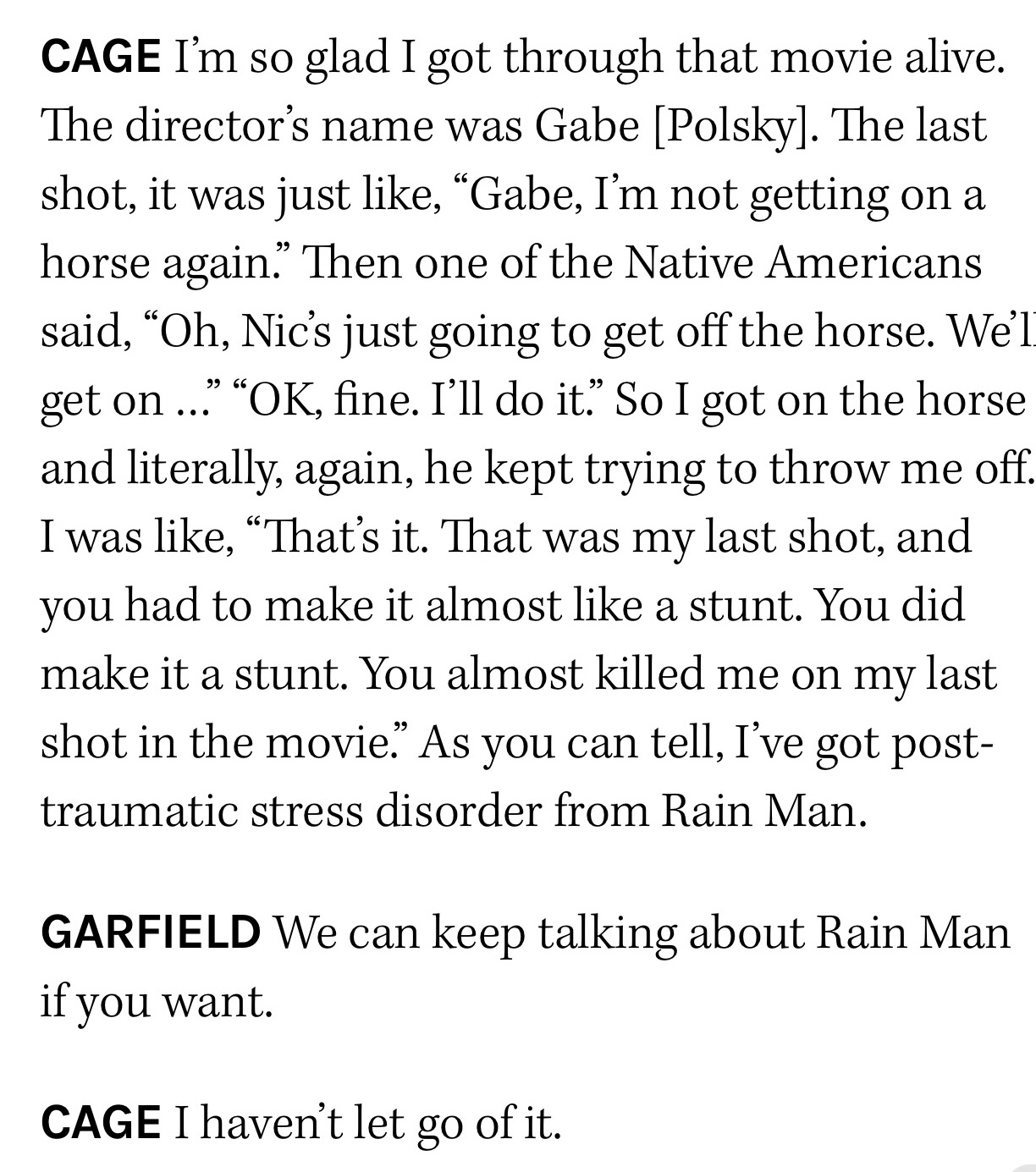
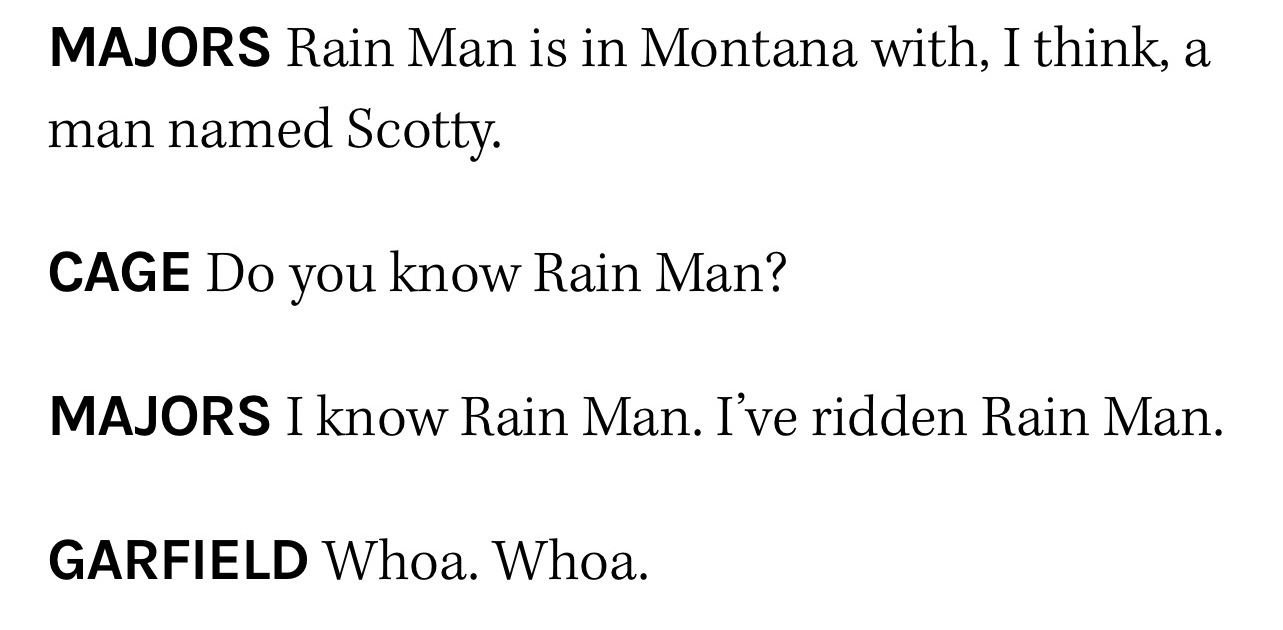
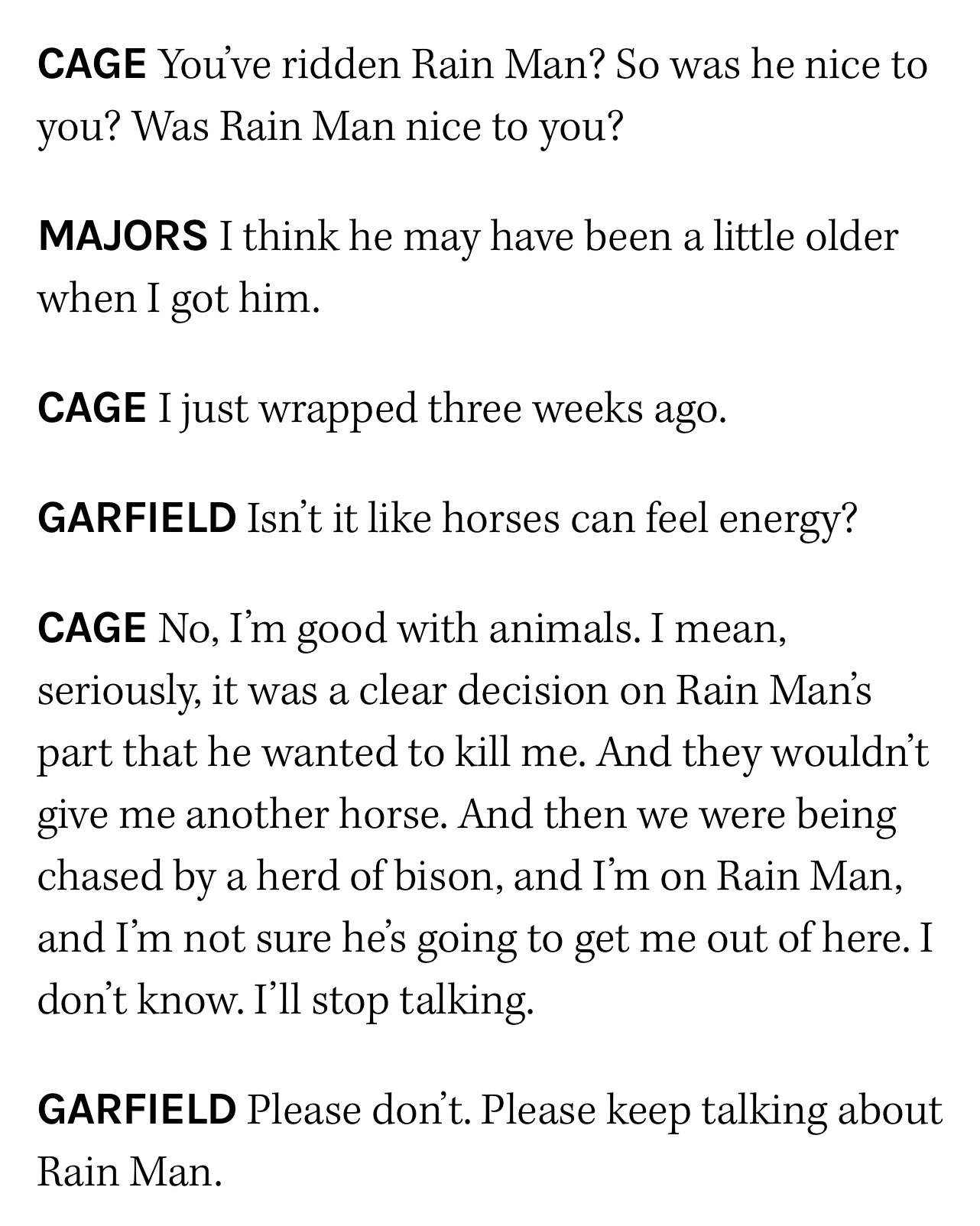
Sundance Is Over — Nobody Cares
The Sundance Film Festival mattered a great deal for 26 or 27 years, which is a long time when you think about how Robert Redford, Jeff Gilmore and John Cooper spearheaded the mythology of indie Hollywood and changed the game so much between the early ’90s and the mid teens, and how influential it all was. Nobody can take away those glory years. I was there for 25 or 26 of them (’94 to ’19, something like that) and I loved every chapter, every surprise, every breakthrough, every film that made a mark, every adventure and wild party. It’s all over now, but that’s the way of things. Sooner or later, every good idea or initiative or inspirational course of action comes to an end.
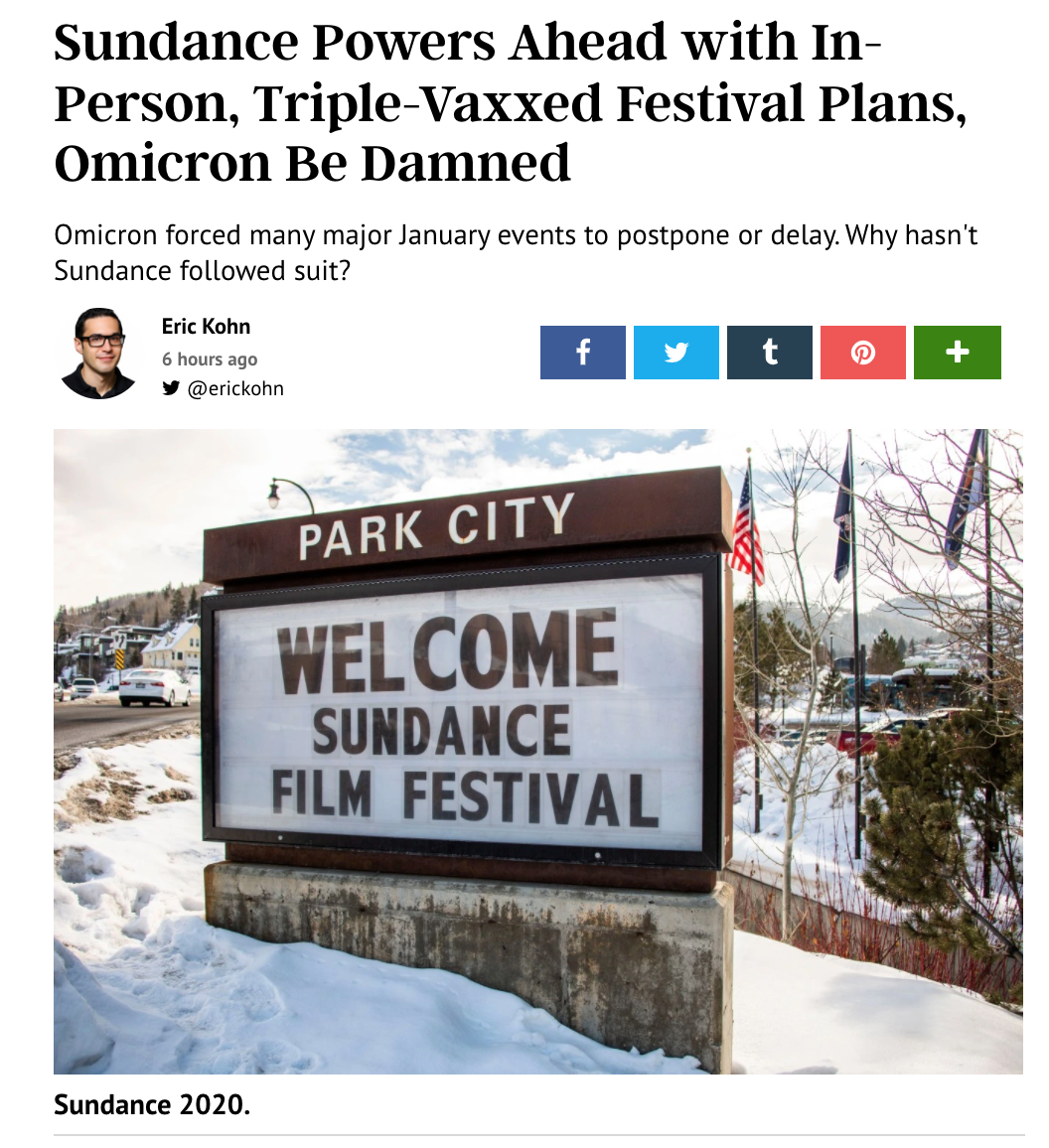
Buy Boxy “Touch of Evil” While You Can
HE to Kino Video regarding upcoming Touch of Evil 4K Bluray (streeting on 2.22.22): As you guys presumably recall, England’s Masters of Cinema / Eureka Video released two versions of a Touch of Evil Bluray in two aspect ratios — 1.85 and 1.37 — roughly a decade ago.
A Kino Lorber spokesperson has confirmed that their forthcoming 4K version will be formatted only in 1.85.
In November 2011 Eureka Video released a Bluray of Orson Welles‘ Touch of Evil (1958) with five different versions of the film.
We’re actually talking three versions of the film, two of which are presented in both 1.37 and 1.85 aspect ratios and one (the 1958 pre-release version) presented in 1.85 only. The 1998 reconstructed version, running 112 minutes, that was put together by Walter Murch, Bob O’Neil and Bill Varney, is presented in 1.37 and 1.85.
Two aspect ratios for both versions is so hardcore, so film-nerdy…your heart goes out to people with this much devotion.
But the orange jacket-cover backdrop is, for me, a problem. To advertise a revered classic film taking place in a Mexican border town and shot in the gritty environs of Venice, California, Eureka chose one of the most needlessly intense and eye-sore-ish colors in the spectrum? A color that says traffic cones and prison jump suits?
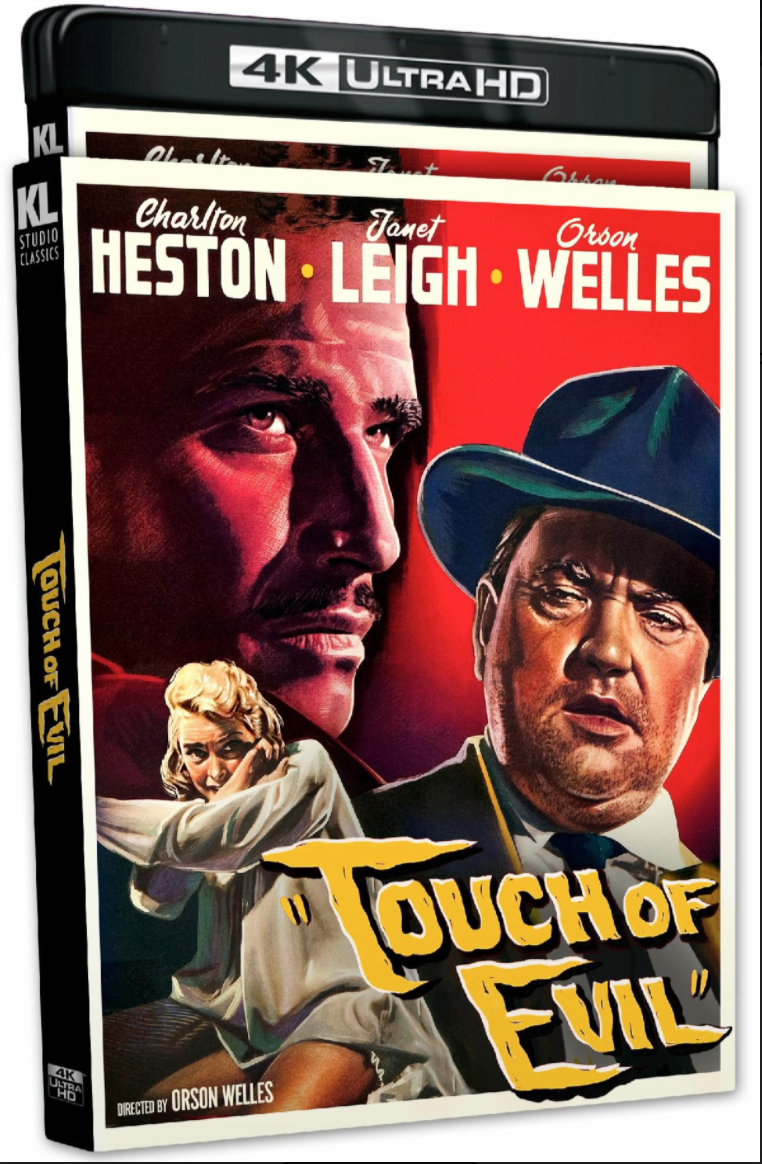
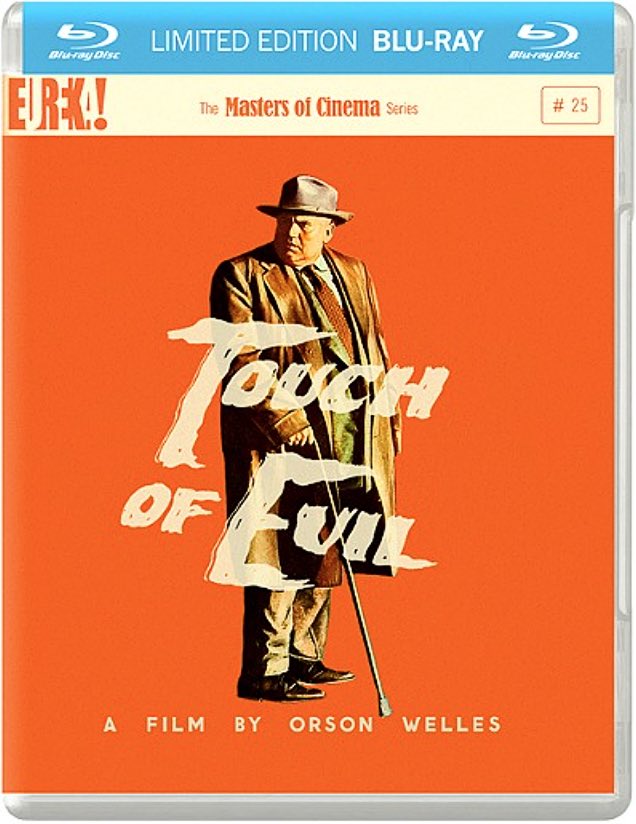
Best Picture Contender as Hothouse Flower
Last night Sasha Stone tapped out a longish paragraph [below] that explained the idea of a hothouse flower Best Picture contender. She was responding to people who were attempting to belittle the idea of Spider-Man: No Way Home being Best Picture-nominated.
My definition of a hothouse-flower Best Picture nominee is fairly generic — one that is frail and extra delicate, and can only thrive inside a glassed-off, temperature-controlled, lovingly pampered environment…a film that would sadly but instantly start to wither and die after being exposed to the raw and unruly elements.
The hothouse flower caregivers are the virtue signallers, the secular elitists, the Passing fancies, the Drive My Car raise-high-the-roof-beam carpenters, the friends of Apichatpong Weerasethakul, the Annette whisperers, the Green Knight worshippers, the festival wokesters, the precious misters and constant gardeners (Eric Kohn, Jessica Kiang, Justin Chang, David Ehrlich, Anne Thompson)…the Gold Derby whores (safety in numbers)…the Telluride lovebirds who oohed and aahhed over Spencer like parents smiling at a newborn infant.
I don’t happen to feel that Maggie Gyllenhaal‘s The Lost Daughter qualifies (I think it’s a real movie…a bit weird but true to itself) but every Kelly Reichardt film is, by natural default, a hothouse flower. And the biggest hothouse flower of the entire award season, of course, is Jane Campion‘s The Power of the Dog.
You can call Spider–Man: No Way Home this or that, but one thing you definitely can’t call it is a hothouse flower.
Friendo: “The reason [certain films] aren’t hothouse flowers is that they weren’t conceived and financed to win Best Picture at the Oscars. Not every ‘small’ or independent or foreign movie, made simply to be itself, is a hothouse flower. Parasite wasn’t a hothouse flower; what happened there was a fluke. But The Power of the Dog was most definitely conceived as Jane Campion‘s Return To Oscar Glory.
“Yes, it would be absurd for Drive My Car to be nominated for Best Picture. To nominate that movie — as the rich-kid fucks on Twitter are now advocating — would be insane. The rich kids want to kill the Oscars. They want to kill democracy. They want to kill everything.
“But not every smallish film of artistic reach that plays on the fall-festival circuit necessarily meets all the criteria for hothouse -flowerdom. Sure, those films are, by definition, being positioned as potential Oscar contenders. But partly it’s an aesthetic judgment. I feel like The Power of the Dog and Belfast are hothouse flowers in no small part because they fail as storytelling.”
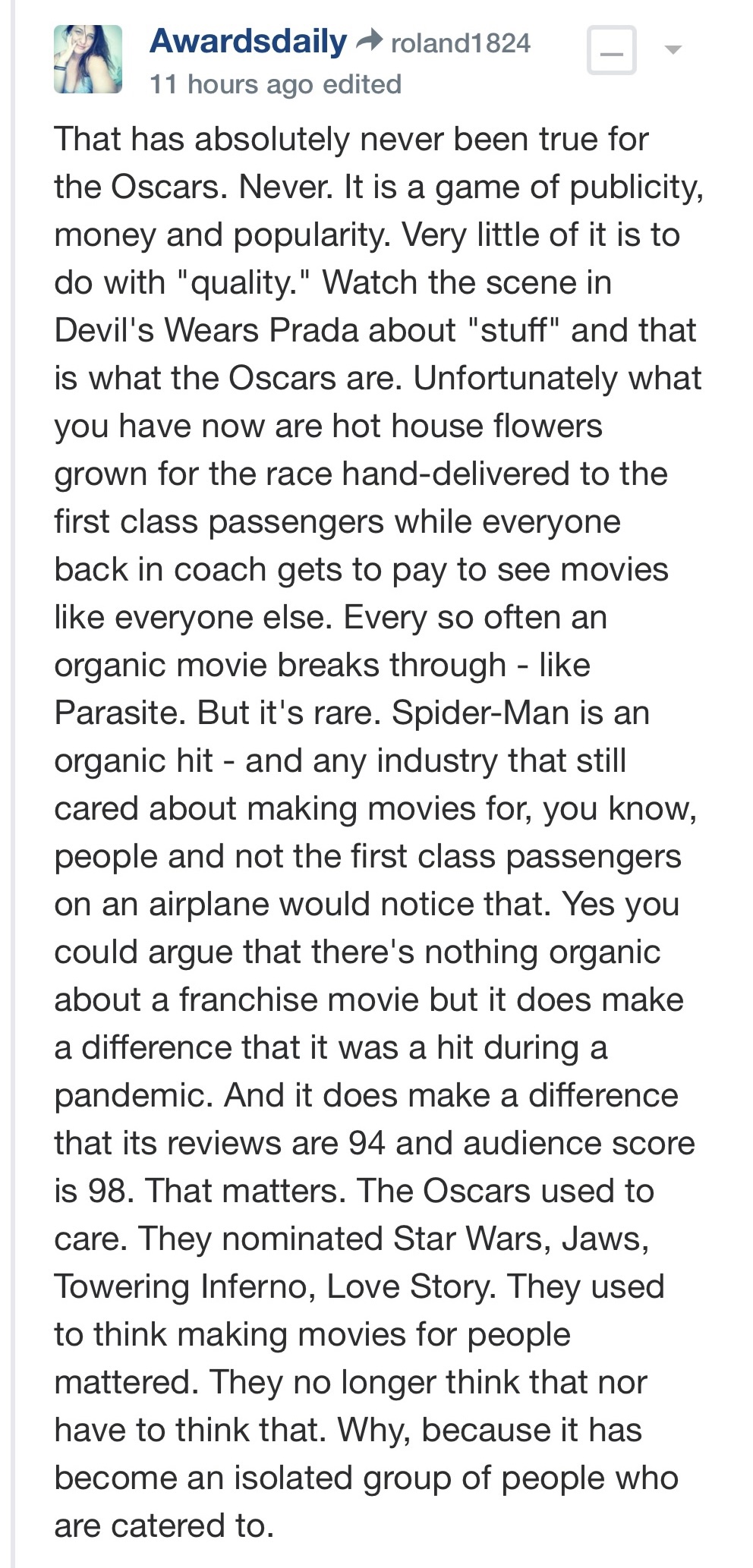
Johnny Walker To Rescue
If you know your Sterling Hayden stories, the one about being unable to deliver Gen. Jack Ripper‘s dialogue on Hayden’s first day of shooting Dr. Strangelove is perhaps the most familiar of all. But the story still sings.
Brian Wilson’s “Smile“
Sutton’s first smiles began to happen just before New Year’s Eve. After five or six weeks of living and looking around and assessing things on her own. This is the first half-decent capturing of one of those moments, or at least the first I’ve been shown.

Denial, Rabbit Holes, Lunacy
“We no longer share basic truths,” says New York Times columnist Thomas Friedman about some supporters of former Pres. Trump who are in denial about the Jan. 6 insurrection. “The country as a whole is losing its cognitive immunity, it’s ability to sort out fact from fiction.” pic.twitter.com/ZVEWCzZlWL
— Anderson Cooper 360° (@AC360) January 4, 2022
